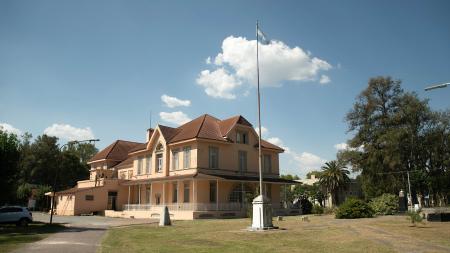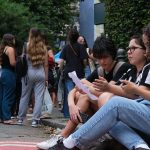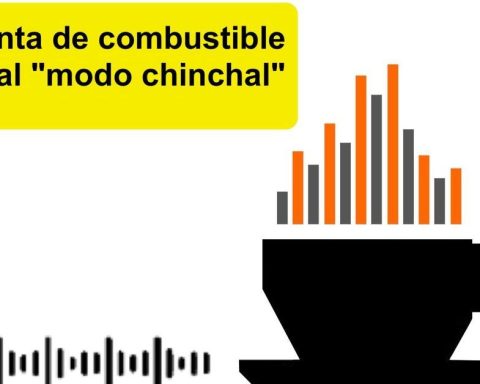The Colonia Nacional Montes de Oca, specialized in people with intellectual disabilities, is in a process of “transformation” as part of a strategic plan that includes the creation of an inclusive neighborhood and the incorporation of proposals open to the community, which gives account of the “process of change in the conception of mental health,” said the director of the institution, Silvina Aguilar, during a tour with Télam around the place.
On March 1, during the opening of the ordinary sessions in Congress, President Alberto Fernández praised the work of Aguilar in the leadership of the Colonia Nacional Montes de Oca, an institution located in the town of Torres, in the Buenos Aires district of Luján, which houses 461 people with intellectual and physical disabilities.
Fernández said that the neighborhood, under the Ministry of Health, is “going through a transformation process that aims to overcome the Asilar Model and generate devices that guarantee the dignity and autonomy of the people who reside there.”
Aguilar received Télam in the 250-hectare property that is surrounded by trees, vegetation, orchards and imposing houses -many built in the last century-, which although they still function as lodging pavilions, are in a process of “enhancement” as part of the strategic plan started in 2021.
“This plan is a historical fact in the transformation process of the neighborhood. The works are part of the project and in this sense, the tenders to build walls are the simplest, but then you have to start changing the logic of the neighborhood mainly” , assured the general practitioner graduated from the University of Buenos Aires (UBA).
A benchmark in comprehensive health care and specialized in the care of mental health and intellectual disability problems, the institution seeks to promote the implementation of the Mental Health Law through three axes: “improvement of the quality of life, rehabilitation and social inclusion and openness to the community,” explained Aguilar.
Users of the colony expressed their satisfaction with the carnival
Users of the Colonia Nacional Montes de Oca shared their excitement for the carnival celebration that took place last Friday at the institution and referred to the activities they carry out, among which is “the garden and the workshops”, as well to be able to attend school and travel to Mar del Plata.
In dialogue with Télam, and while talking with one of the directors, Edu, 30, who came to the institution as a child, shared his excitement about the carnival in the neighborhood, for which he had prepared his costume several days before and that he dressed in the festivities despite the heat.
The young man, who wore a modern haircut “shaved on the sides”, also said that he does gardening and drawing activities, among which he highlighted “cartoons” as his main entertainment.
For his part, Hernán (31) highlighted the same anxiety about the carnival, along with the possibility of starting primary school in a few days, which several of the users attend.
During a tour of the property, Hernán said that he also works in the community garden, where he “harvests seedlings and vegetables,” and receives a salary for his work, which he does Monday through Friday from 8 a.m. to 2 p.m.
In this regard, Silvina Aguilar, director of the colony, pointed out that “the State and the institution guarantee them coverage of basic needs, such as food, housing, medical attention, medication and support, and the money that is theirs is used for their shopping”.
This money comes from subsidies along with the work they do both in the garden and in the recycling cooperative, which allows them to save and make trips, for example to Mar del Plata.
“I got to know the sea recently, you don’t know what it was, I would throw myself on the sand and stay like that,” Hernán expressed with a smile and a gesture of satisfaction, as if they were resting on the beach.
The residents also have therapeutic companions who accompany them to make their purchases, which are sometimes communal, such as when they buy televisions or if they organize a party or barbecue, Aguilar said.
Meanwhile, within the group of women who drank mate on the façade of pavilion number four, were Mabel, María del Carmen and Pato, who pointed out: “this Saturday we have a little party”, on the occasion of the carnival.
“We like to cook, we make cakes, pizzas and empanadas,” said one of them.
On the other hand, among the users who attend the primary school in Torres is María del Carmen, who interrupted listening to the radio to emphasize that she is already in fifth grade and “studying is going very well for her.”
The woman said that what she likes the most are family trips to the coast, something that, she said, she would like to “repeat.”
Strategic plan: “Montes de Oca to the community”
Founded in 1915 as a neuropsychiatric hospital to initially house “boys and girls”, with the management of Dr. Manuel Montes de Oca in 1967 it was renamed a national colony to “provide assistance to people from all over the country who require it and do not have support in their community,” he said.
“107 years passed with all the ups and downs and different policies around mental health and people with disabilities” until the drawing up of the strategic plan that began in August 2021, he added.
The assistance provided by the institution is focused on the Mental health and intellectual disability care from an interdisciplinary approach for people who “have previously exhausted all efforts to support themselves in their community of origin, that is our social role as well,” Aguilar said.
The strategic plan started with “the improvement of the pavilions and the enhancement of the facades, which required a waterproofing treatment and we had to start fixing them inside and out,” said the director.
To this is added one of the central axes of the project, the “unpavilionization” of the institution where users still reside, for which it is sought to culminate “soon” with their location in residential devices within a “inclusive neighborhood”and thus be able to open “Montes de Oca to the community”he detailed.
In this regard, Ernesto Koop, psychologist and director of care coordination at Montes de Oca, maintained that “in the face of the voice of a certain hegemonic power in psychiatry, which wants nothing to change, or those who want everything to be closed as if the State later it could be absent, there is a third line that we propose and it is the one that we bet on in the strategic plan”.
“The colonies are always oriented to the optimization of human resources from a panoptic logic, in terms of (Michel) Foucault, where with the least amount of human resources you can assist the greatest amount of people,” explained the specialist.
In contrast to this “asylum model”, focused on the handicap and disability of people, Koop proposed the alternative of “multipurpose model” where “living conditions can be improved” and the pavilions where users stay “are the setting for other things, linked to culture, sports and recreation, such as museums and gyms.”

In this sense, the works and transformations planned in Montes de Oca imply a residential expansion and construction of gyms and recreation spaces for both residents and the community of Torres and nearby municipalities.
“It is not difficult for the people of Torres to come and participate. 80% of the people who work in this institution are from Torres. The town was founded behind the colony,” said Aguilar.
Users and users of the colony they are trained in cultivation and recycling together with labor cooperatives of the institutionallowing them to earn a salary and share their knowledge.
“Recyclers have also gone through the town to explain, for example, what issues they have to separate and this is not a minor detail, because it places a person with an intellectual disability as the holder of knowledge,” Koop said.
For this reason, the director remarked that “it is not minor to have changed the name of mental health to call it integral health, people are not a body and a mind; we are a whole and we insist on this path.”
Currently, the institution is equipped with a Interdisciplinary Center for Integral Health (CISI) and performs teaching, research, rehabilitation and inclusion tasks. In addition, it has a 24-hour medical guard.
“It is a city and all the work that is carried out is for users to live better,” concluded Aguilar.

They will rename the neighborhood in recognition of the sanitarian Ramón Carrillo
The Colonia Nacional Montes de Oca sent a project to be renamed “Doctor Ramón Carrillo Hospital and Community” as part of its transformation process “in recognition of the great Argentine sanitarian who raised like no one that without equity and inclusion, there is no health,” he said Silvina Aguilar, general practitioner and director of the institution.
“It is very complex to define in a few words the different health benefits and social functions that the institution fulfills. It is not an acute care hospital, but it is not a rehabilitation hospital either,” Aguilar explained to Télam during a tour of the institution.
Although it houses and works on the inclusion of users, “at the same time acute conditions are addressed and care is provided from the first level, each time from more disciplines and also diversifying our target population,” he added.
For this reason, the doctor and director remarked that, given the diversity of actions carried out, “it seemed important to us to highlight two concepts: that of the hospital, as we belong to the health area, and that of the community, as opposed to a asylum model”.
Meanwhile, he remarked that the renown of Ramón Carrillo “is a recognition of the great Argentine sanitarian who raised like no one else that without equity and inclusion, there is no health.”
Ramón Carrillo was a neurosurgeon, neurobiologist, sanitary doctor and the first Minister of Health of the Nation who graduated from the Faculty of Medicine of the University of Buenos Aires in 1929, with a Medal of Honor.
He was also a tenured professor of the chair of Neurosurgery at the Faculty of Medicine, although he abandoned his career as a neurologist to dedicate himself to the development of social medicine (sanitary).
















